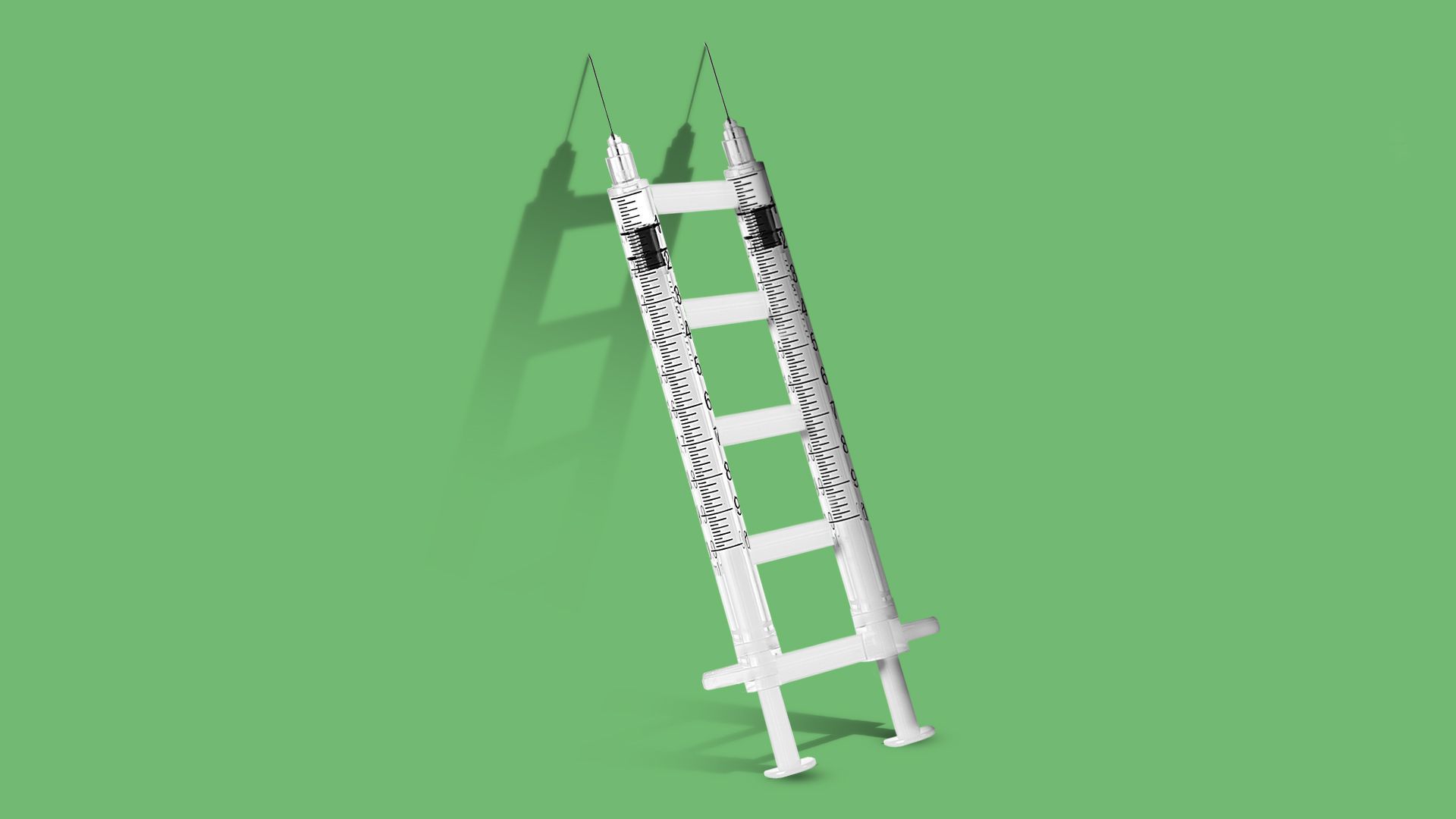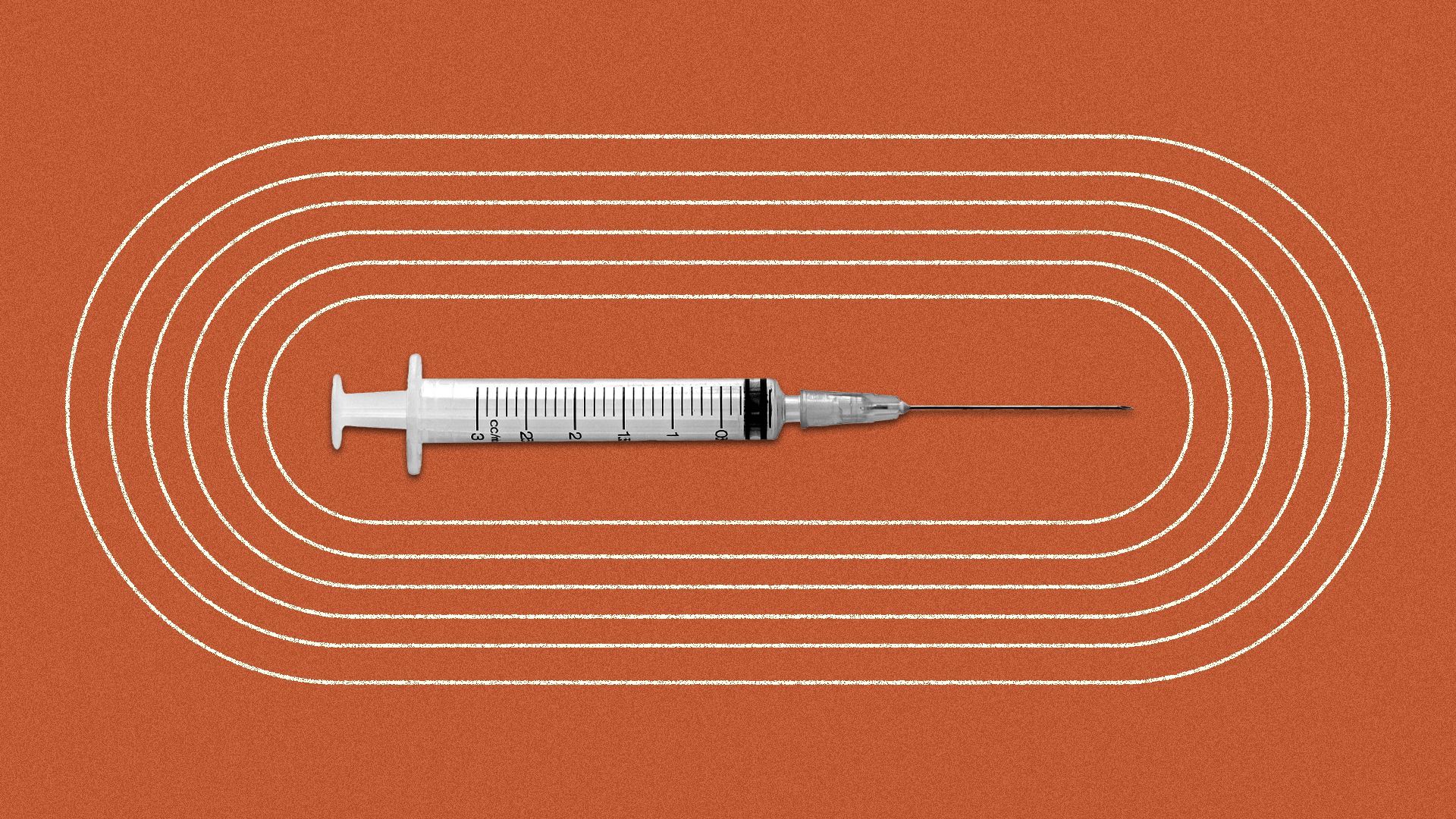| | | | | | | Presented By Babbel | | | | Axios World | | By Dave Lawler ·Mar 11, 2021 | | Welcome back to Axios World. - Tonight's edition (1,750 words, 6 minutes) starts with some great news, ponders the ethics of booster shots, and takes a trip to the moon.
- A personal note: Thanks for all the well wishes ahead of my wedding last weekend — I'm fortunate to have such kind readers. We managed to make it down the aisle with a few friends and family members on hand and many more tuning in via livestream.
New arrival? Sign up. | | | | | | 1 big thing: Good news, unevenly distributed |  | | | Illustration: Aïda Amer/Axios | | | | Today provided two major reasons for optimism about the global pandemic recovery. Driving the news: Real-world data from Israel found that the Pfizer-BioNTech vaccine was at least 97% effective in preventing symptomatic COVID-19 cases, and President Biden signed a $1.9 trillion stimulus bill that the Organization for Economic Co-operation and Development (OECD) projects will add a full percentage point to global economic growth this year. - The dramatic rebound in the U.S. economy — thanks to the vaccination campaign and rescue package — should directly benefit top U.S. trading partners, particularly Canada and Mexico, per the OECD.
- "This will not only boost the U.S. economy, but it will fuel global growth through increased demand in the U.S. and from the U.S. to the rest of the world," said OECD chief economist Laurence Boone.
- While Chinese growth helped power the recovery from the 2008 financial crisis, the U.S. should be at the center of the rebound this time.
That rosy economic outlook is inextricably linked to an expectation that the U.S. and eventually the world will be able to vaccinate their way out of the pandemic. - The new data from Israel — indicating that Pfizer's vaccine appears to be 94% effective against asymptomatic infection and 97% effective at preventing hospitalizations and deaths — is another beam of light at the end of the tunnel.
- So is today's news that Novavax's still-to-be-approved vaccine is up to 96% effective.
The other side: A recovery based on vaccinations and stimulus spending risks leaving behind the countries that haven't been able to deploy much of either. - While the OECD now projects the U.S. economy to be slightly larger by the end of this year than had been expected prior to the pandemic — thanks to the massive stimulus bill — the economies of India, Indonesia, South Africa and Mexico will be 6–8% smaller than anticipated.
- Some developing economies are expected to take years to claw back the growth they lost during the pandemic. Investors could be tempted to move out of emerging-market economies and into the U.S., the WSJ notes.
- Meanwhile, the World Bank projects that there will be 150 million more people living in extreme poverty by year's end as a result of the pandemic.
What they're saying: International Monetary Fund chief Kristalina Georgieva is warning of a "great divergence" between countries, due in large part to the vaccination gap. - Rather than catching up to advanced economies, the IMF anticipates that the gap in incomes between rich and poor countries will grow between 2020–2022.
- She sees that looming divergence as a "major threat to global economic and social stability."
- And if the Federal Reserve is forced to raise interest rates to tamp down inflation, emerging markets will be hit particularly hard, Harvard economist Kenneth Rogoff notes.
The bottom line: After a brutal year, we can now see the green shoots of a global recovery — but they're unevenly distributed. |     | | | | | | 2. Where the vaccines are going |  The U.S. has 4% of the world's population, 20% of all recorded COVID-19 deaths, and 29% of all vaccine doses administered to date. The big picture: The U.S. and U.K., both devastated by the pandemic, have sprinted far out ahead of other large countries in terms of vaccine rollout. - Meanwhile, Japan and South Korea, two rich countries that were hit less hard, have barely started their vaccination campaigns. The delays are due to a combination of lower urgency, cautious governments and a skeptical public.
- Half of South Koreans, for example, say they'd rather wait to see how vaccinations go elsewhere before getting a jab themselves, per the Economist.
- Meanwhile, most African countries and many low-income countries in Asia and the Americas have yet to administer a single dose, not due to a lack of urgency, but to a lack of access.
|     | | | | | | 3. The ethics of booster shots |  | | | Illustration: Brendan Lynch/Axios | | | | President Biden announced on Wednesday that the U.S. would secure an additional 100 million doses of the Johnson & Johnson vaccine to provide "maximum flexibility" to America's rollout. Why it matters: The doses aren't expected until later in the year, after the first wave of vaccinations will be over in the U.S., and they're intended for potential booster shots or to vaccinate children. That means the U.S. could be stockpiling "just in case" doses as other countries are still struggling to get access for even high-priority individuals. - Biden also committed in his remarks on Wednesday to provide any surplus doses to the rest of the world.
- But with a "maximum flexibility" approach — which White House press secretary Jen Psaki said today depended on being "over-prepared and over-supplied" — it will be difficult to determine when exactly doses become "surplus."
Driving the news: Pfizer is conducting a study in the U.S. on the protection provided by a third dose six months after the second dose. - Some countries are already placing orders for next year with boosters in mind, CEO Albert Bourla told my colleague Caitlin Owens for this week's "Axios on HBO."
- Given concerns about new variants, "the scientific premise" behind that approach is "very solid," Bourla said.
But what about the ethics, given Americans could be getting boosters before people in poorer countries get a single shot? - Bourla said that if Pfizer hits its production targets — over 2 billion doses this year and 3 billion next year — and other manufacturers follow suit, such questions "will be resolved" because there won't be shortages to contend with.
- Zeke Emanuel, a member of Biden's coronavirus task force during the transition, told me last month that given the pace at which production is increasing, even if the U.S. holds back tens of millions of doses for boosters, it would be "a drop in the bucket."
- Biden also framed the latest J&J order as a matter of increasing production, rather than pulling scarce doses off the shelf.
Yes, but: While the U.S. expects to have enough supply for its first wave of vaccinations by May, most countries don't expect to hit that point until next year or later. - Production increases could shift that equation, but so too could the decisions of rich countries like the U.S. that control enough doses to vaccinate their populations several times over.
- While Biden still presents the idea of surplus supply as a possibility, it should in fact become a reality by May, based on his own production targets.
The bottom line: Biden's "maximum flexibility" approach at home could soon come into conflict with his aim of stepping up to defeat the pandemic around the world. |     | | | | | | A message from Babbel | | How to learn a new language in three weeks | | |  | | | | 73% of Babbel users said they could have a simple conversation in their new language after just 5 hours of lessons. The reason: The language app makes it easy with bite-sized lessons, so you can spend less than 15 minutes a day learning language skills you'll remember. Sign up today and get 50% off. | | | | | | 4. Global news roundup: Lula is back |  | | | Lula's high-volume return. Photo: Alexandre Schneider/Getty Images | | | | 1. A Brazilian supreme court justice may have set up a heavyweight presidential showdown in 2022 between populists on the left and right by annulling the corruption convictions of former President Luiz Inácio Lula da Silva on a technicality. - Lula, president from 2003 to 2011, is still Brazil's most popular politician, and he had a strong shot at winning a third term in 2018 before being ensnared in the Lava Jato corruption probe and tossed off the ballot.
- 50% of Brazilians say they'd consider voting for him, while 44% would not — higher than the 38%/56% split for President Jair Bolsonaro, a right-wing nationalist.
- Lula made a comeback address on Wednesday ahead of a likely presidential bid, lambasting Bolsonaro's "moronic" approach to the pandemic.
2. Myanmar's military junta has charged deposed leader Aung San Suu Kyi with taking bribes amid ongoing protests against last month's coup. 12 protesters were reportedly killed today. - The military has been looking for grounds on which to hold the highly popular Suu Kyi ever since her arrest five weeks ago. The original charges, of illegally possessing imported walkie talkies, were not particularly convincing.
3. The arrest of Senegalese opposition leader Ousmane Sonko has sparked a week of protests that were also fueled by an economic downturn and fears that President Macky Sall will seek a third term in 2024. - The scenes are highly unusual in the West African country, considered one of the region's most stable democracies.
4. The lower house of Mexico's Congress passed a bill on Wednesday to legalize recreational marijuana. Some version of the bill is expected to soon be passed by the Senate and signed by the president. 5. Tanzania's president and Covid-denier in chief, John Magufuli, hasn't been seen in public for 12 days amid reports that he has himself been hospitalized with the coronavirus. |     | | | | | | 5. Data du jour: Food prices and instability |  Global food prices have been rising for months, putting additional pressure on the world's poorest people, Axios' Bryan Walsh writes. Why it matters: Past spikes in the price of food staples have been connected to periods of social unrest, including the Arab Spring. Go deeper |     | | | | | | Mark your calendars: Biden's Asia pivot in action | | March 12: President Biden meets virtually with the leaders of the other "Quad" countries — Australia, Japan and South Korea. - The grouping is crucial to Biden's plan to use alliances to counter China, though the four don't always see eye to eye on the China threat.
- They're expected to discuss efforts to distribute vaccines, reduce reliance on Chinese rare-earth minerals, counter China's maritime moves and more.
March 15–18: Secretary of State Blinken and Secretary of Defense Austin make their first foreign visits, to Tokyo and Seoul. - The trip's goals include underlining Biden's commitment to alliances and coordinating approaches toward China.
March 18: Blinken and national security adviser Jake Sullivan will meet with their Chinese counterparts in Alaska — the first in-person meeting between the Biden and Xi Jinping administrations. |     | | | | | | 6. One to watch: Russia and China take on the moon |  | | | That is the moon. Photo: Nasa | | | | Russia and China this week announced plans to create a shared scientific research station on the Moon, Axios' Miriam Kramer writes. Why it matters: Countries are turning their attention to landing people on the Moon in the coming years, and this partnership between China and Russia — a longtime U.S. partner in space — shows just how much the geopolitical landscape in space is changing. - It's another dramatic gesture of cooperation from the countries' leaders, who have warmed up to one another as relations with Washington have frozen.
Worth noting: A new poll from the Levada Center finds that 74% of Russians view China favorably, and a plurality (40%) consider China to be Russia's closest friend. |     | | | | | | 7. Stories we're watching |  | | | Enjoying the Baikal ice festival in Listvyanka, Russia. Photo: Stanislav Krasilnikov\TASS via Getty Images | | | - China passes law to control Hong Kong elections
- U.S. grants temporary protected status to Venezuelans
- Russia slows down access to Twitter
- Pandemic watch: Brazil case spike, U.K. opens schools, Variants drive surge
- Interview: Biden envoy on Iran timeline
- U.S. and EU suspend tariffs
- International Olympic Committee buys Chinese vaccines
Quoted: "Taiwan is like two feet from China. We are 8,000 miles away. If they invade, there isn't a f**king thing we can do about it." — Donald Trump to a U.S. senator, according to Josh Rogin's new book |     | | | | | | A message from Babbel | | The app that'll teach you a new language in less than a month | | |  | | | | Babbel helps you become conversational in a new language with just three weeks of practice. The number one selling language app teaches you the skills you need for real-life scenarios, excluding any random words or unhelpful phrases. Get 50% off one of 14 languages. | | | | | | Axios thanks our partners for supporting our newsletters.
Sponsorship has no influence on editorial content. Axios, 3100 Clarendon Blvd, Suite 1300, Arlington VA 22201 | | | You received this email because you signed up for newsletters from Axios.
Change your preferences or unsubscribe here. | | | Was this email forwarded to you?
Sign up now to get Axios in your inbox. | | | | Follow Axios on social media:    | | | | | |
No comments:
Post a Comment